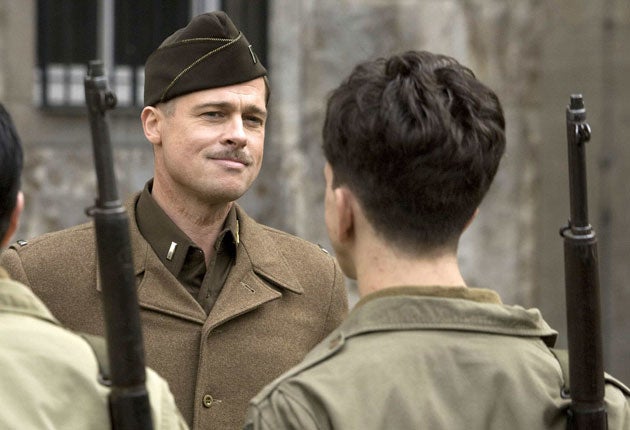First Night: Inglourious Basterds, Cannes Film Festival
Tarantino bounces back to gloriously violent form

"I think this might be my masterpiece," Lt Aldo Raine (Brad Pitt) declares after carving a swastika on a Nazi's forehead toward the end of Quentin Tarantino's Inglourious Basterds. The film might not be Tarantino's masterpiece but it is his most entertaining and exhilarating effort since Pulp Fiction.
As ever, this is a film about other films as much as it is about its ostensible subject – vigilante Jewish Nazi hunters during the latter part of the Second World War. It should be noted at the outset that Tarantino's treatment of the Second World War is resoundingly superficial. Don't look for nuance or depth here or for sophisticated analysis of what lay behind the Holocaust.
Nor is this really an action movie. There are great action sequences along the way – including a tremendous opening that plays like a Germanic version of Sergio Leone, with the Nazis turning up on their motorbikes on the horizon and driving toward a small farmhouse where a Jewish family is hidden.
What really propels the movie, though, isn't the gun-toting but Tarantino's wise-cracking, brilliantly inventive dialogue. It is a film shot in Germany and made in many different languages: everyone speaks in their own tongue. Usually, this would be the surest route to Euro-pudding flatulence.
However, Tarantino makes a virtue of what must have appeared an enormous hindrance, moving lithely between languages and generating humour from cultural and linguistic differences between Brits, Germans, Yanks, Italians and the French.
In the director's familiar, scattershot fashion, elements are thrown together from spaghetti westerns, Sam Fuller's The Big Red One, Robert Aldrich's The Dirty Dozen and even Ernst Lubitsch's To Be Or Not To Be. Hitler, Goebbels and Churchill all put in appearances. There are nods in the direction of Leni Riefenstahl, old UFA movies and even a nod or two in the direction of British wartime cinema. Other directors' work would sink under the weight of so many references but somehow they seem to energise rather than slow down a movie that is already very long.
The plot doesn't make a huge amount of sense. It centres on Operation Kino, a plan which the Inglourious Basterds (as the Jewish vigilantes are called) have hatched to bomb a Paris cinema in which Goebbels is holding the premiere of a propaganda picture about a heroic Sergeant York-like Nazi sniper.
Despite the wartime setting, we're still in Tarantino's universe. Many of the protagonists resemble characters found in earlier Tarantino movies. Mélanie Laurent's vengeful young Jewish woman is not so different from Uma Thurman in the Kill Bill films. The Basterds have some of the same swagger as Reservoir Dogs.
The way the Germans are drawn is so broad that it makes the characterisations in Allo, Allo! seem restrained. However, there is an intensity about the film-making and performances that stops even the more absurd elements here appearing risible. You can't help but admire Tarantino's chutzpah. No other director would have the gall to throw in a David Bowie song ("Putting Out Fire With Gasoline") in a 1940s war film or to cast Rod Taylor as Winston Churchill.
The violence is often extreme – the Jewish Nazi hunters have a habit of scalping their victims; one hunter likes to batter in his antagonist's head with a baseball bat; and a shoot-out in an underground bar is sheer bloody carnage – but it comes in bursts and has a comic book element about it.
Some will be offended, although it's hard to get too upset about a film made with such geekish enthusiasm.
Christoph Waltz gives a wonderfully (and intentionally) hammy performance as the movie chief villain, the urbane but very sadistic "Jew Hunter" Colonel Landa. It's a purring, eye-rolling performance that evokes memories of Laurence Olivier's Richard III. Brad Pitt, the ostensible star, isn't on screen as much as might have been expected but brings a cheery comic élan to his role as the Jewish Tennessee moonshine smuggler turned Nazi killer.
At times, there are so many competing plotlines and characters that the film risks drifting off into incoherence.
Tarantino knows, though, that what you need to end a film like this is a very big bang. This he provides courtesy of old-fashioned, highly flammable nitrate film stock, which (we learn) burns three times faster than paper. It's an in-joke – a film explosion being caused by film – but it still works a treat.
Join our commenting forum
Join thought-provoking conversations, follow other Independent readers and see their replies
Comments
Bookmark popover
Removed from bookmarks